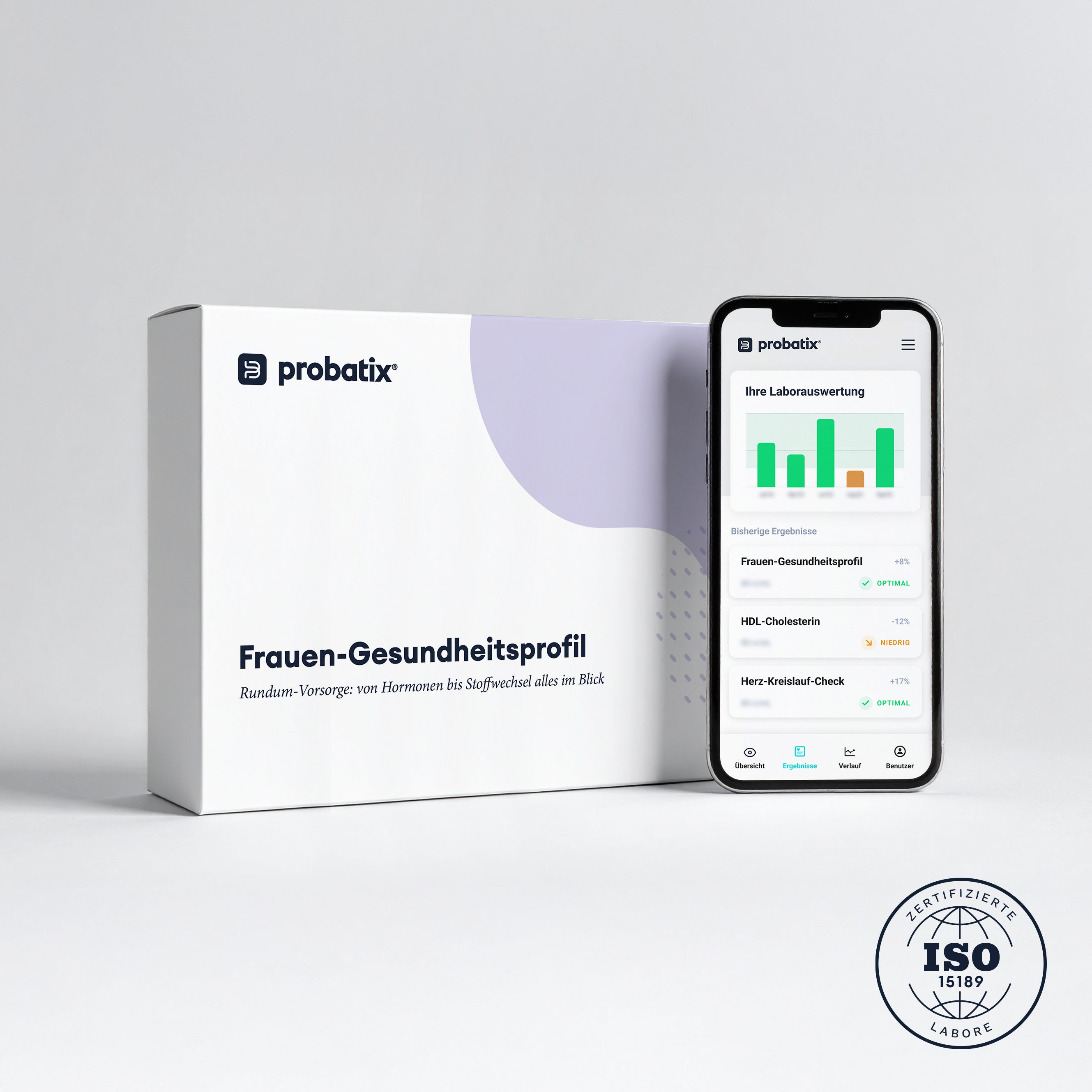Women's Health Profile
Women's Health Profile
Many health changes remain unnoticed for a long time – the Women's Health Profile helps you gain clarity.
- Comprehensive Health Check: Analyzes key values for thyroid (TSH, fT3, fT4), cardiovascular (total cholesterol, HDL, LDL, triglycerides, HbA1c), and hormonal balance (cortisol, prolactin, SHBG).
- Early Detection Made Easy: Identifies potential deficiencies or imbalances early and supports your proactive health care.
- Convenient & reliable: Easily perform blood sampling at home, professional lab analysis, and clear results in the dashboard.
For all women who want to actively monitor their health.
In stock
What values does this test measure?
What values does this test measure?
Further information on the values can be found here.
How does it work?
How does it work?
1. Take a sample with our test kit
2. Send the sample to the lab with the prepaid envelope
3. View results digitally after a few days
Why are the values reliable?
Why are the values reliable?
All tests offered by us are evaluated and validated in certified medical laboratories in Germany.
This is what the press says about our tests
Women's Health Profile: All details about the test
What benefits does this test offer me?
What benefits does this test offer me?
Fill in the text content of the collapsible item here. You can provide details and explanation for the question here.
When was the last time you had a check-up?
We often only notice health changes when they affect our daily lives. With the Comprehensive Check for Women you receive early clarity and can actively take care of your health – simple, precise, and reliable.
This check analyzes the most important health areas:
- Long-term blood sugar (HbA1c): Detects signs of a possible glucose imbalance early and helps understand diabetes risks.
- Heart and circulation: Monitor your cholesterol and blood lipid levels to stay healthy in the long term.
- Thyroid: The TSH value provides valuable insights into the function of your thyroid – an important factor for energy, weight, and well-being.
- Hormonal balance: Prolactin and SHBG provide insights into your hormonal balance, which can affect your vitality and quality of life.
- Folic acid: Essential for blood formation and a central component for your well-being.
Your health is your most valuable asset – take care of it.
The comprehensive check-up for women gives you the opportunity to have crucial blood values analyzed conveniently from home – simple, fast, and reliable.
What do the measured values mean?
What do the measured values mean?
Fill in the text content of the collapsible item here. You can provide details and explanation for the question here.
25-OH-Vitamin D is the storage form of Vitamin D that the body produces in the liver from Vitamin D formed through sunlight or food. Vitamin D supports calcium absorption, ensures healthy bones and teeth, and plays an important role for muscles, nerves, and the immune system.
The 25-OH-Vitamin D test is the best method to check Vitamin D status. Low levels can indicate too little sunlight, an unbalanced diet, or diseases and are associated with bone diseases such as osteoporosis or rickets. Excessive levels usually result from too high supplement doses and can strain the kidneys and liver.
Cholesterol
Cholesterol is a fat-like substance that the body needs for many important functions. It is a building block of cell membranes, a precursor for hormones such as estrogen and testosterone, and for the production of bile acids. A portion is absorbed through food, but the majority is produced in the liver.
Excessive cholesterol levels can lead to deposits in the vessel walls and increase the risk of cardiovascular diseases. However, a balanced level is important, as cholesterol is also essential for health.
LDL cholesterol
LDL cholesterol is referred to as "bad cholesterol" because it transports cholesterol from the liver to the body's cells. Excess LDL can deposit in the vessel walls and form so-called plaques. These deposits narrow the vessels and increase the risk of cardiovascular diseases.
High LDL levels are an important risk factor for arteriosclerosis, heart attack, and stroke. Low levels, on the other hand, are considered beneficial for vascular health.
HDL cholesterol
HDL cholesterol is often referred to as "good cholesterol" because it transports excess cholesterol from the vessels to the liver. There, it is broken down or recycled, reducing deposits in the arteries. Thus, HDL helps to keep the vessels healthy and free from calcifications.
High HDL levels are considered beneficial as they are associated with a lower risk of cardiovascular diseases. On the other hand, low levels increase the risk of arteriosclerosis and heart attack.
Triglycerides
Triglycerides are the main form of fats in the body and are primarily stored in fat cells. They are formed when excess energy from food is converted into fat. Some triglycerides circulate in the blood and serve as an energy source.
Elevated triglyceride levels can increase the risk of cardiovascular diseases, especially when LDL is high and HDL is low at the same time. Very high levels can also trigger inflammation of the pancreas.
Cortisol
Cortisol is a hormone produced in the adrenal cortex that controls the body's metabolism and stress response. It regulates blood sugar levels, blood pressure, and influences the immune system. Cortisol typically follows a daily rhythm, with the highest levels in the morning and the lowest at night.
Permanently elevated cortisol levels can lead to weight gain, high blood pressure, sleep disturbances, and a weakened immune system. Too low levels indicate an underactive adrenal gland and can be associated with fatigue, low blood pressure, and weakness.
Cystatin C
Cystatin C is a protein that is produced in all body cells and is filtered out of the blood by the kidneys. Since the production of Cystatin C in the body is relatively constant, the value is well-suited for assessing kidney function.
In contrast to creatinine, Cystatin C rises early when kidney performance declines. Therefore, it is considered a sensitive marker for timely detection of early kidney weakness.
Ferritin
Ferritin is a protein that stores iron in the body and releases it when needed. The ferritin level in the blood indicates how well the body's iron stores are filled and is therefore often used to assess iron status.
Low values usually indicate an iron deficiency or anemia. Elevated values may suggest inflammation, liver diseases, or iron overload.
TSH
TSH (Thyroid-stimulating hormone) is produced in the pituitary gland and regulates the activity of the thyroid gland. It stimulates the thyroid to produce the hormones T3 and T4, which influence metabolism and many body functions.
High TSH levels usually indicate an underactive thyroid, as the body tries to boost hormone production. Low TSH levels, on the other hand, suggest an overactive thyroid.
fT3 (free triiodothyronine)
fT3 is the active form of the thyroid hormone that acts directly in the cells and regulates metabolism. It influences heart rate, energy consumption, digestion, and many other body functions. A large portion is produced by the conversion of the hormone T4 into T3 in the liver and kidneys.
Elevated fT3 levels usually indicate hyperthyroidism, while low levels may suggest hypothyroidism or a disturbance in the conversion of T4 to T3.
fT4 (free thyroxine)
fT4 is the precursor of the active hormone T3 and is predominantly produced by the thyroid gland. It circulates in the blood and can be converted into T3 in the organs to stimulate metabolism.
High fT4 levels typically indicate an overactive thyroid. Low levels, on the other hand, suggest an underactive thyroid.
Gamma-GT (G-GT)
GGT is an enzyme that is primarily found in the liver and bile ducts. It is released into the blood when these organs are damaged or stressed. Therefore, GGT is an important marker for liver health.
Elevated levels may indicate alcohol abuse, liver inflammation, bile obstruction, or certain medications. Normal levels usually indicate intact liver function.
GPT (ALT, ALAT)
GPT, also called ALT, is an enzyme that occurs almost exclusively in the liver. When liver cells are damaged, it enters the blood and the level increases.
An elevated GPT level is therefore a sensitive indicator of liver diseases such as hepatitis or fatty liver. Normal values indicate a healthy liver.
Long-term blood sugar (HbA1c)
HbA1c is a long-term blood sugar value that indicates the average blood sugar level over the past two to three months. It forms when sugar attaches to the red blood pigment hemoglobin. Since red blood cells live for about three months, the HbA1c value provides a good overview of long-term blood sugar control.
A high HbA1c value suggests poorly controlled or previously undetected diabetes. Normal values indicate stable and good blood sugar control.
Prolactin
Prolactin is a hormone produced in the pituitary gland. It plays a crucial role in the development of the mammary glands and in milk production after birth. Even outside of pregnancy and breastfeeding, prolactin can be detected in the blood.
Elevated prolactin levels can lead to menstrual cycle disorders, infertility, or milk flow without pregnancy. In men, elevated levels often manifest as potency disorders or reduced sexual drive. Low levels are rare and usually of little significance.
Sex hormone-binding globulin (SHBG)
SHBG (Sex hormone-binding globulin) is a protein produced in the liver that binds sex hormones such as testosterone and estrogen in the blood. This regulates how much of these hormones are free and thus biologically active.
High SHBG levels mean that less free testosterone or estrogen is available, which can occur in cases of liver disease or hyperthyroidism. Low levels lead to more free hormone and occur, for example, in cases of obesity, diabetes, or hypothyroidism.
Why is this test important?
Why is this test important?
Fill in the text content of the collapsible item here. You can provide details and explanation for the question here.
Your health is the foundation for energy, balance, and well-being. Women often face specific health challenges, such as hormonal changes or nutrient deficiencies, which can go unnoticed until they affect daily life. The Women's Comprehensive Check offers a thorough analysis of important health markers to:
- Identify potential risks such as hormonal imbalances or cardiovascular issues early on.
- Gain clarity about your health status and better understand your body.
- Take proactive measures for long-term health and vitality.
With this test, you receive valuable insights that enable you to make informed decisions about your health. It is more than just a test – it is a step towards a healthier life.
When should I take this test?
When should I take this test?
Fill in the text content of the collapsible item here. You can provide details and explanation for the question here.
The Women's Comprehensive Check is ideal if you:
- want to check your general health.
- are experiencing symptoms such as fatigue, exhaustion, or hormonal issues.
Knowledge want to know if your cardiovascular system and metabolic values are in balance.- want to identify and prevent potential risks early.
- is part of regular health care.
This test helps you learn more about your health and actively take care of your well-being – exactly when you need it.
What is included in the test kit?
What is included in the test kit?
Where can I find the instructions?
Where can I find the instructions?
Fill in the text content of the collapsible item here. You can provide details and explanation for the question here.
Die Anleitung für diesen Labortest finden Sie auf Instructions: Capillary Blood Tests.Bei Fragen hilft Ihnen auch immer gerne unser wunderbarer Support weiter: support@probatix.de
FAQ - More Frequently Asked Questions about the Test
FAQ - More Frequently Asked Questions about the Test
Fill in the text content of the collapsible item here. You can provide details and explanation for the question here.
What is examined in the comprehensive check-up for women?
The test analyzes important health markers such as thyroid levels, cholesterol levels, liver and kidney values, as well as relevant hormones to provide a comprehensive overview of your health.
Who is this test suitable for?
The comprehensive check-up for women is suitable for anyone who wants to actively monitor their health – especially in cases of fatigue, hormonal changes, or a family history of certain conditions.
How does the sampling work?
The sampling is conveniently done from home with a capillary blood test from the fingertip. You will receive a test kit with all necessary materials and detailed instructions.
How long does it take to receive my results?
After sending in the sample, you will typically receive your detailed lab results digitally within 3–5 business days.
What can I deduce from the results?
The test results provide you with valuable insights into your metabolism, hormone balance, as well as potential deficiencies or imbalances that could affect your well-being.
What happens if my values are outside the reference range?
If abnormalities are detected, you should discuss the results with a doctor. They can recommend further examinations or targeted measures.
Can I also use the test for regular health monitoring?
Yes, the comprehensive check-up for women is ideal for regularly checking your most important blood values and responding early to changes.
How reliable are the results?
The analysis is carried out in a certified specialist laboratory according to the highest medical standards, so you can rely on precise and reliable results.
Das sagen unsere Kunden
















